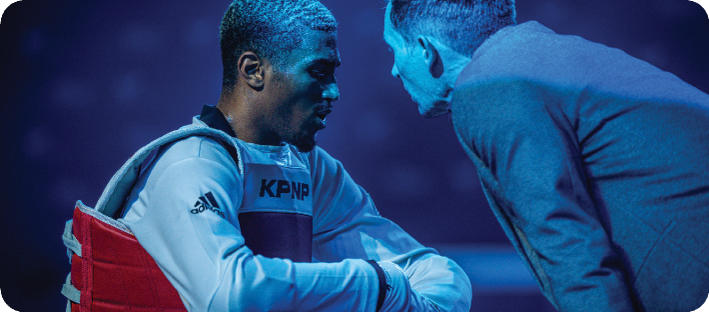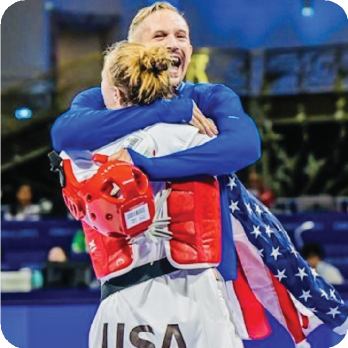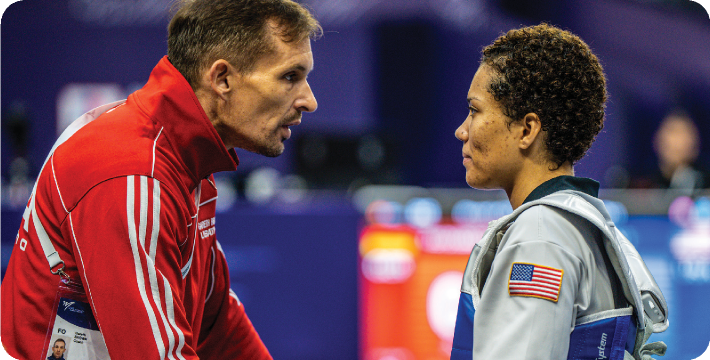By Go2 Karate
Dr. Greg Moody:
Hello. This is Dr. Greg Moody with Go2 Karate Magazine, and I’m looking forward to this special interview. We’ve got Denise Morin, editor of
Go2 Karate Magazine, and we’re really happy to have Gareth Brown, Head Coach, United States Taekwondo. Thanks a lot for being here, sir.
Gareth Brown:
Thanks for the invitation, I’m excited to chat with you guys.
Dr. Greg Moody:
I think a lot of the things that you talk about with combat sports are going to apply to the martial arts students. What first drew you to Taekwondo?

Gareth Brown:
It came through family, my father. He was in the military and at one point in his career, he was posted in Hong Kong. He learned Taekwondo, and then he brought it back to the United Kingdom where it was unheard of at the time. He just started teaching classes and training me from four years old.
Dr. Greg Moody:
He was probably one of the first people that started working with kids.
Gareth Brown:
Yeah. There weren’t many Taekwondo schools, clubs, or teams based in the United Kingdom. It was those days of no protection on the feet, no match, just fighting with claws and wearing no headguards or helmets.
Dr. Greg Moody:
You were probably getting a little beat up at a young age. How did you transition from that to being a coach?
Gareth Brown:
I started coaching young through my father’s Taekwondo school, often leading 20 students in a class of 60. I loved it from the start. Seeing kids succeed at their goals gave me real satisfaction and that feeling pulled me deeper into coaching. It’s what sparked everything for me. My father was in a position with local government where he managed children’s homes, so there were a lot of kids under his care that were practicing Taekwondo, and I’m sure that was very beneficial to them. At the time, there weren’t many kids my age doing Taekwondo. Whereas now, you see a lot of kids, especially in the United States.
Dr. Greg Moody:
How’d you get into combat sports and starting to compete in all the tournaments?
Gareth Brown:
We focus on the high-performance Olympic path in Taekwondo, which brings intense pressure. When I began coaching 12 young athletes, I emphasized gradual exposure to competition to build confidence. Taekwondo offers many potential “X factors” speed, height, mental toughness and success comes from identifying and developing each athlete’s unique strength. As they advance, they learn to use that strength tactically against tougher opponents. This method builds confidence, resilience, and versatility key traits for long term success in the sport.
Denise Morin:
What are your thoughts on what the kids are getting from martial arts that isn’t physical? Parents nowadays are looking more for the non-physical skills their child is going to gain. What, as a coach, would you say to that?
Gareth Brown:
Martial arts give young kids confidence to speak up, stand tall, express themselves, and fight back when needed. With great instructors and the right environment, they gain discipline, respect, and communication skills that transfer to school, relationships, and future careers. As training progresses, especially at elite levels like Olympic prep, martial arts instill habits like goal setting, accountability, and self-reflection. Athletes also learn about life essential nutrition, sleep, hydration, and lifestyle balance—while performing under pressure. Whether it’s your child’s first class or a shot at the Olympic podium, martial arts prepare you to succeed in high stakes, uncomfortable situations. It is personal development with a black belt. Keep open communication with both the kids and their parents, especially for younger children. Set up a clear, structured competition plan with goals that focus on performance, not just winning. The objectives should be attainable and emphasize physical and mental growth.
Dr. Greg Moody:
You’re talking about getting people to a really high level, like earning Olympic medals. How early would be the ideal time to start for that kind of Taekwondo training?
Gareth Brown:
Some of the same methods we use at the Olympic level work just as well with eight- and nine-year- olds. They’re that effective. No matter your goal, black belt in Taekwondo or karate or judo, first competition, or Olympic gold, what matters most is having clear, step-by-step objectives. If you’re committed and professional, those goals are achievable. Whether you’re up against a longtime rival or stepping onto the mat for the first time, clarity and consistency will carry you.
Dr. Greg Moody:
How young would you like people to start if they want to earn a medal?
Gareth Brown:
There’s no one size fits all answers. Research hasn’t nailed down the perfect starting age. We’ve seen athletes transition into Olympic Taekwondo from other martial arts like kickboxing, even if they only started Taekwondo recently. It’s an adaptable sport, and a solid martial arts foundation. From ages six to ten tend to work well. Some kids thrive at six, others need until ten, but that age range is a good window to begin.
Dr. Greg Moody:
Absolutely it’s a big commitment for families. But with clear priorities and support, it’s manageable. Busy schedules are normal success comes from choosing what matters most.
Gareth Brown:
It’s the million-dollar question. Balancing family life and training is tough, but it helps when families train together, especially with young kids. I’m lucky to have a supportive wife who carries half the load, and with my own kids, I’ve focused on exposing them to multiple sports first. My best advice? Let kids try different activities so they choose what they truly enjoy—because if they’re not into it, it’s a battle. Fortunately, my kids chose Taekwondo, which just means I spend even more of my “off” time doing what I do for work.
 Dr. Greg Moody:
Dr. Greg Moody:
What are the key things that people have to do? I’m really interested in the Olympic medal because I’ve actually had some students that moved on to Taekwondo Olympics. They trained with us for a while, and then they went to a school that was more focused on the Olympics. What kind of key milestones did they have to hit to get to that kind of really high level?
Gareth Brown:
To pursue Olympic level Taekwondo, you need early and frequent exposure to international competitions, specifically within the World Taekwondo format. Start by finding a strong Taekwondo school, earn your black belt, and work your way through state and national competitions. Once you’re competitive nationally, branch out into the Pan Am region—places like Canada, Mexico, and Brazil offer strong opponents. If you’re still flying under the radar, step it up by competing in tougher regions like Asia, Europe, or Africa to gain visibility and sharpen your edge.
Dr. Greg Moody:
It sounds like if you’re going to get to the Olympics, you better do a lot, you better have a very high frequency of competition.
Gareth Brown:
It’s incredible how much more competition athletes face now compared to when I competed. They’re navigating a packed calendar, often injured, because of how the sport is governed at the top,especially by the IOC, the International Olympic Committee. Changes to fit Olympic broadcast schedules completely altered the rules, which in turn changed how hard and how often athletes compete. Despite concerns, the workload keeps growing, and with Taekwondo being a smaller Olympic sport, we don’t have the pull to fight it like bigger sports do. People ask when our season starts or ends, but truthfully, we don’t even have one.
Denise Morin:
Do you have one particular memory or story about someone, one of your students, a success story, and what that meant to you as a coach?
Gareth Brown:
One of my first real coaching successes came early in my career. I was working with my father and created a program for 12 young athletes to train with me as a team—four or five times a week, plus individual and group sessions. I developed a progression: domestic competitions, then national, then international. Eventually, I began taking the team into Europe. Around that time, Great Britain Taekwondo reached out and brought me on in a subcontract role. One standout athlete was a girl I started coaching when she was seven. We trained for years, and she competed in two Junior European Championships, one of the toughest regions to win in. She took gold. Watching her win was unreal. She stood frozen in shock while I, still young myself, was practically doing leapfrogs over chairs. Then, out of nowhere, her father somehow climbed over the stadium wall in Cyprus and jumped into the ring hugging me with tears in his eyes. That moment, her victory, his pride, was unforgettable. Easily my most memorable success.
Denise Morin:
What a fantastic story! Thank you for sharing that.
Dr. Greg Moody:
You work with really high-level competitors. What would you say for people that are not as high level, or that’s not something that’s a focus for them. Would you feel like they would still get a lot of benefits out of martial arts?
Gareth Brown:
Absolutely. Knowing why you’re training is key, whether it’s for fitness, emotional release, fun, sparring, or the creativity of forms. When you understand your reason, martial arts become incredibly powerful. It offers structure, progress, and confidence. Every style has a grading system; belts, sashes, or something similar that helps track growth and reinforce your improvement. It’s not just about physical skills; it’s about setting goals, finding the right support, and seeing clear progress. No matter your reason, martial arts delivers massive benefits across the board, mentally, emotionally, and physically. It becomes more than training; it becomes a personal journey of development and success.
Dr. Greg Moody:
What challenges have you faced as a coach that had been difficult?
Gareth Brown:
Coaching at the grassroots level versus the national level is a completely different experience, something you only understand by doing both.
Early on, I worked with a small group of young athletes and parents. It was tight knit, personal, and incredibly rewarding. At the national level first with Great Britain, then the U.S.—the pressure is higher, the dynamics more complex, and you’re managing not just athletes, but other coaches and support staff. It becomes more about collaboration than direct coaching. The biggest difference is scale. Grassroots coaching is more personal and fulfilling, while national coaching is broader and strategic. Personally, I find the grassroots level more enjoyable and impactful.
Dr. Greg Moody:
Well, I appreciate what you’re saying. I think that you’ve given us, and the people reading this, a lot of insight into not just Taekwondo, but Taekwondo in the Olympics.
Gareth Brown:
It’s a major commitment and needs serious thought. In my experience coaching in full time, government funded Western programs, athletes get top level support—everything from transition help to performance resources. But despite how well managed these systems are, many athletes leave because they underestimated the demands. They didn’t expect it to be so relentless, with constant competitions, frequent injuries, and intense external pressure. It’s not just training, it’s a lifestyle. So before committing, athletes need to ask tough questions and talk to others who’ve been through it. Understand what you’re really signing up for, because it’s not just big, it’s life changing.
Dr. Greg Moody:
Hopefully that message resonates with anyone starting this path. It highlights the dedication and sacrifices these athletes make. Thanks for your honesty. Any final thoughts you’d like to share with our readers, whether they’re martial artists, school owners, or simply passionate about the discipline?
Gareth Brown:
Absolutely! The 2028 Olympics will be the first time the U.S. Taekwondo team competes on home soil. USA Taekwondo is actively recruiting talent including from other combat sports so if you dream of winning an Olympic medal, now’s the time. Reach out and take your shot at history.
Dr. Greg Moody:
Where can they go to get more information?
Gareth Brown:
Go to USATaeKwonDo.com. Reach out. There’s a list of staff names on there and contact details.
Dr. Greg Moody:
It’s really inspiring to get to talk to you, and hopefully our readers get a lot out of this. Thank you so much for all the time you spent with us today.
Denise Morin:
Yes, thank you. It’s very interesting to hear about all the good you’ve done.
Gareth Brown:
Thanks for having me, it’s been great to meet you both. Good luck with everything that you’re working on, and I hope we’ll speak again soon.

Gareth Brown is a passionate and driven coach who leads the USA Taekwondo team with energy and heart. Originally from the UK, where he competed internationally and trained under elite programs, Gareth moved into coaching to help athletes reach their full potential. Since joining the USA Taekwondo in 2018, he’s helped shape the next generation of champions, most notably guiding Anastasija Zolotic
to Olympic gold in Tokyo. With a focus on discipline, strategy, and motivation, Gareth continues to inspire his athletes to dream big and compete with confidence on the world stage.